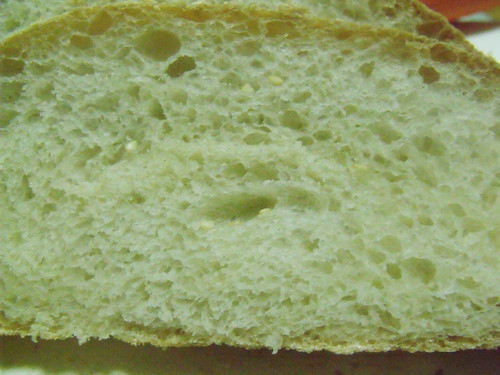Hello! I just baked the Pane Siciliano from BBA, and I'm not sure if the bread is supposed to be so soft! I followed the instructions closely, cutting back on a bit of water as it was extremely wet (and I mean extremely. I tried Bertinet's slap-and-fold, but gave up and did repeated stretch-and-folds at 10 mins intervals until the dough passed the windowpane test.. about 4 reptitions of stretch-and-fold in total)
The dough was very floppy and refused to be formed into a batard so I couldn't create enough surface tension for it to proof properly :( Heated oven to as high as it could go (about 482F) and had a steam pan in. I took it out of the oven when the inside registered around 200 F (90 C for me) and the crust was nice and crackly. However, as it cooled on the rack the crust softened. This happened with my previous loaf (a malted flour loaf) as well and I am wondering if it might have to do with the humidity as this did not happen to me when I was in London. Currently I am in Singapore where the humidity levels go over 80% easily...
Also, the inside of the bread was very soft and quite pillowy, though not in the underbaked way. I would like to ask the advice of other people in the forum who have baked this bread as well.. Here is the crumb shot.. Definitely not as open as mentioned and pictured in the book.
My mom and sis really liked the bread, and I was okay with it.. Just really curious to know why my crust and crumb are turning out the way they are. Thanks for any suggestions/comments/advice! :)

It's only one picture, but a bread I make often.
The crumb looks about right, maybe a bit underbaked, but close enough. It is supposed to be soft and pillowy. The crust also looks about right. It's not supposed to be thick. When it's right out of the oven, it's very hard, but does soften after about an hour. It doesn't get *soft* though, as you might expect from an enriched dough.
Hi spinypineapple,
I am sure that all the problems you mention come from the high humidity where you currently live.
Techniques you can use to overcome this:
Regarding the baked loaf, you need to find a cooler, darker and drier place to store the bread. Effective cooling of the baked loaf will also be difficult too. I guess that is the most difficult part of the process to conquer in Singapore.
Given I'm in the North of England, it's not a problem I'm that familiar with, except in hot commercial bakeries, where they use specialist cooling equipment.
Best wishes
Andy
Thanks for the advice! Yes, I did not have this problem when I was in London, so I think the humidity affected my crust quite a bit.. Will have to bake more to acclimatize